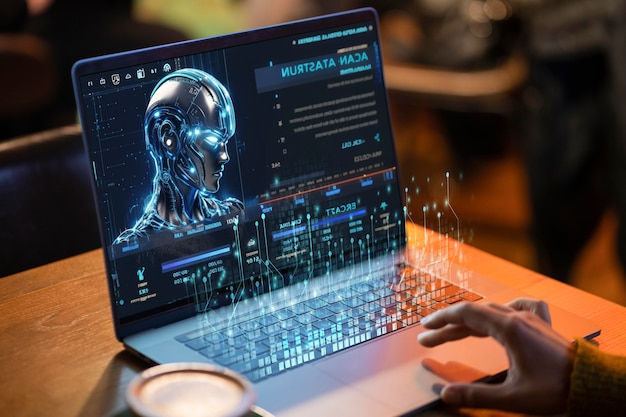Artificial intelligence has become a disruptive force, changing how traditional teaching techniques and learning experiences are delivered. As 2024 is in full swing, artificial intelligence integration in education is progressing to unprecedented heights and provides creative answers to persistent problems.
This article examines how artificial intelligence is transforming the education sector and influencing how people learn in the future.
Personalized Learning
One of the most significant contributions of AI to education is the ability to tailor learning experiences to individual student needs. AI algorithms analyze vast amounts of data, including students’ performance, learning styles, and preferences, to create personalized learning paths.
This ensures that each student receives a customized curriculum, adapting to their strengths and addressing their weaknesses. Adaptive learning platforms powered by AI can identify gaps in knowledge and provide targeted interventions, fostering a more efficient and effective learning process.
Intelligent Tutoring Systems
AI-driven intelligent tutoring systems have gained prominence in 2024, providing students with virtual tutors that offer personalized guidance and support. These systems leverage machine learning algorithms to understand student progress, adapt content delivery, and provide real-time feedback.
This approach enhances students’ understanding of various subjects and promotes self-directed learning. Intelligent tutoring systems can identify student performance patterns and adjust task difficulty accordingly, ensuring an optimal learning curve for each individual.
Gamification for Engagement
Incorporating gamification elements has become a popular strategy to enhance student engagement and motivation. AI is crucial in developing gamified educational experiences that make learning enjoyable and interactive. Intelligent algorithms track students’ progress, identify areas of improvement, and dynamically adjust game elements to challenge learners appropriately. Gamification captures students’ interest and fosters a sense of competition and collaboration, creating a more immersive learning environment.
Automated Grading and Feedback
AI-powered automated grading systems have streamlined the assessment process for educators. These systems can quickly evaluate objective assessments, such as multiple-choice tests, and provide instant feedback to students.
This saves teachers valuable time and allows students to receive prompt insights into their performance. Moreover, AI algorithms can analyze written assignments, providing detailed content, structure, and grammar feedback. Automating grading tasks enables educators to focus on more complex aspects of teaching, such as personalized instruction and mentoring.
Virtual Reality and Augmented Reality in Education
In 2024, AI will be pivotal in enhancing virtual and augmented reality educational experiences. Immersive technologies powered by AI algorithms create realistic simulations, allowing students to explore historical events, conduct virtual experiments, or engage in interactive simulations.
These experiences provide a hands-on approach to learning, making abstract concepts tangible and promoting more profound understanding. AI algorithms continuously adapt virtual environments based on students’ interactions, ensuring a dynamic and personalized learning experience.
Predictive Analytics for Student Success
AI-driven predictive analytics have become indispensable tools for identifying students at risk of academic challenges. AI algorithms can predict potential hurdles students may face by analyzing historical data, learning patterns, and socio-economic factors.
Educators can intervene early, providing targeted support and resources to prevent academic setbacks. Predictive analytics contribute to a proactive approach to student success, helping institutions implement strategies that enhance retention rates and overall student satisfaction.
Natural Language Processing (NLP) for Language Learning
AI’s natural language processing capabilities have been harnessed to revolutionize language learning. Language learning applications powered by NLP analyze students’ speech patterns, pronunciation, and vocabulary usage, providing real-time feedback to improve language skills.
Chatbots and virtual language tutors use AI to converse with learners, adapting to their language proficiency levels and offering personalized language lessons. This approach enhances language acquisition and fosters cultural understanding through interactive conversations.
Simplifying Administrative Tasks
Beyond the classroom, AI is streamlining administrative tasks in educational institutions. Chatbots powered by natural language processing assist students and faculty in navigating administrative processes, answering queries, and providing information. AI algorithms automate routine tasks, such as scheduling, grading, and attendance tracking, freeing up valuable time for educators and administrators to focus on strategic initiatives and student engagement.
Education For All Through AI
As we witness the transformative impact of AI on education in 2024, it is evident that these advancements are not merely technological novelties but powerful tools driving positive change.
-The personalized learning experiences
– Intelligent tutoring systems,
– Gamification
– Automated grading
– Virtual and augmented reality,
– Predictive analytics,
– NLP language learning,
– Streamlined administrative tasks collectively contribute to a more efficient, engaging, and inclusive educational landscape.
Embracing these innovations allows educators, students, and institutions to unlock the full potential of AI, creating a brighter and more accessible future for education.
Contact us at VDOIT today for top performing ed-tech and AI solutions!

